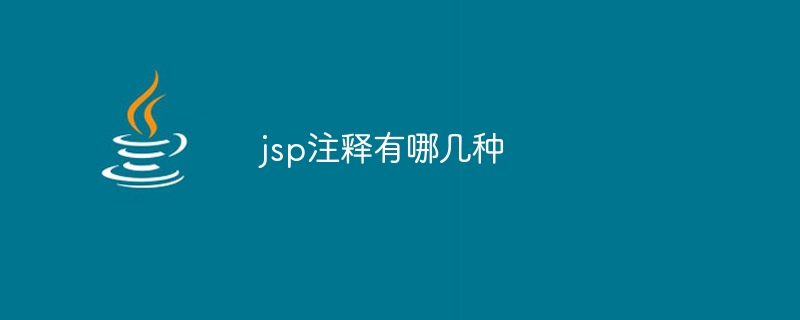
There are two types of jsp comments, namely HTML comments and JSP comments. Detailed introduction: 1. HTML comments. This kind of comments appears in the form of "" in the JSP page. HTML comments are invisible to client users and are mainly used to add in the source code. Explain or temporarily remove certain code segments without affecting the actual display effect of the page; 2. JSP comments, this kind of comments appear in the form of "<%-- --%>" in the JSP page, JSP comments Mainly used to hide code that you don't want to be seen by client users, etc.

The operating system for this tutorial: Windows 10 system, DELL G3 computer.
1. There are two main types of comments in JSP (JavaServer Pages): HTML comments and JSP comments.
1. HTML comments: This kind of comment appears in the form of in the JSP page. HTML comments are invisible to client users and are mainly used to add instructions to the source code or temporarily remove certain code segments without affecting the actual display of the page. For example:
<!-- 这是一个HTML注释 -->
2. JSP comments: This kind of comment appears in the form of <%-- --%> in the JSP page. JSP annotations are mainly used to hide code or annotations that do not want to be seen by client users. These annotations will be ignored when the JSP page is parsed and executed, and will not be displayed in the generated HTML page. For example:
<%-- 这是一个JSP注释 --%>
It should be noted that JSP comments cannot be nested, that is, another JSP comment cannot be used inside a JSP comment. Additionally, JSP comments cannot be used to hide or disable HTML tags or script code, as these codes will eventually be parsed and rendered in the generated HTML page.
In addition to the above two common annotation methods, there are some other annotation methods, such as XML annotations, JavaScript annotations, etc., but they are not JSP-specific annotation methods, so they are rarely used in JSP development.
2. The difference between JSP comments and HTML comments: Mainly lies in their scope and purpose.
1. HTML comments: HTML comments are used to hide HTML code from the browser that does not want to be seen by users, but it will be sent to the client and displayed in the browser displayed in . Therefore, HTML comments are visible to client users. For example, if an HTML comment contains sensitive information or code, that information or code will be displayed in the browser, which may expose the website to security risks.
2. JSP comments: JSP comments are used to hide comments or codes in JSP pages that you do not want to be seen by client users. These comments will be ignored when the JSP page is parsed and executed, and will not appear in the generated HTML page. Therefore, JSP comments are not visible to client users. JSP comments are usually used to add instructions to JSP pages, temporarily remove certain code segments, or hide sensitive information or code to protect the security and privacy of the website.
In summary, the main difference between HTML comments and JSP comments is their scope and purpose. HTML comments are mainly used to hide HTML code from the browser, but these comments are visible to client users; JSP comments are used to hide comments or code in JSP pages that do not want to be seen by client users, but these comments are visible to clients. It is not visible to end users. Therefore, when using annotations, you need to choose an appropriate annotation method based on actual needs.
The above is the detailed content of What are the types of jsp comments?. For more information, please follow other related articles on the PHP Chinese website!




